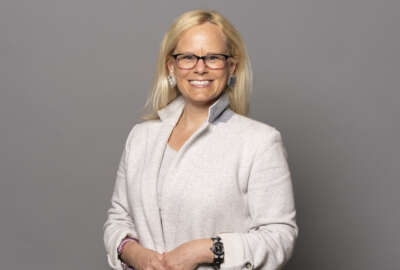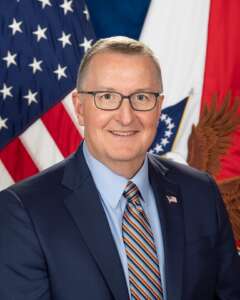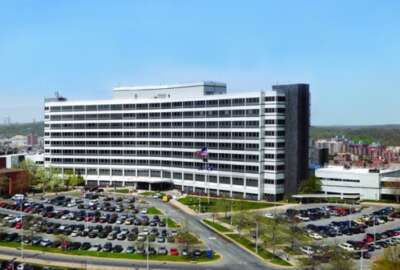

The Biden administration is setting a high bar to improve customer experience across government, but the VA’s National Cemetery Administration is already at t...
The Biden administration is setting a high bar to improve customer experience across government, but the VA’s National Cemetery Administration is already at the top of the charts, according to one scorecard.
NCA ranks number one among all public and private organizations on the American Customer Satisfaction Index. It’s the seventh time NCA has won the top honor, but the latest ranking is the agency’s first since the start of the COVID-19 pandemic.
Under Secretary for Memorial Affairs Matthew Quinn said in a recent interview with Federal News Network that NCA’s top marks from the ASCI, a scorecard released every three years, underscores the agency’s commitment to “own the moment” for veterans and their families.

“There really is no do-over in the case in the case of that interment of the veteran or the loved one. And that memory is what will last with that family, as the nation grieves the loss of another veteran,” Quinn said. “For that cemetery representative, for that call center representative, it’s ensuring that what you are doing right there, for that veteran or for that family member, that’s the last opportunity you have to make it right.”
NCA’s service to veterans and their families starts the moment they receive a call from a funeral home or family member calling about a deceased veteran. The agency also walks families through the burial process and is in the process of expanding access to its online veterans memorial.
About two-thirds of the calls NCA receives come from funeral homes, while the rest usually come from veterans’ families.
Quinn said many NCA employees — like the rest of the VA workforce — are veterans, and are able to empathize with family members seeking assistance.
“As I go out and visit with the employees, that’s what I see — ‘Hey, one day this is going to be me and my family, and so I know how that needs to be for them. And I’m going to make damn sure that the work we do today is exactly what will be done for me or my family when my time comes,’” he said.
NCA currently has a 98% satisfaction score for its call center. About 93% of callers said they were “very satisfied” with their service from the agency. But Quinn said the agency is taking a closer look at the small percentage of unsatisfied customers.
“Let’s take [that] 2% that weren’t satisfied — what is it that we aren’t doing right on that call? Maybe it’s information flow. Maybe it’s just not having the answer that they were looking for. Not every veteran is eligible … not all family members are eligible. We walk through that, and that may lead to dissatisfaction,” Quinn said.
NCA also gathers feedback annually from funeral homes and veterans’ families who are touring or visiting veteran cemeteries. Quinn said the agency also inspects cemeteries to ensure they meet the VA’s “world-class” standards.
To ensure a high level of service over the phone, Quinn said NCA is looking at opportunities to automate some parts of the customer experience.
NCA, for example, is encouraging veterans and their families go to through “pre-need eligibility” screening for funeral benefits. Quinn, a retired major general who served nearly 37 years in the Army and Army National Guard, said he has already determined his eligibility for VA funeral services.
“My family, at time of need, should not be having to wait – and we’re hearing this from our customers. [They] shouldn’t have to be looking through my files to find my DD-214,” Quinn said, referring to his military service records.
Quinn said having more veterans taking care of those eligibility steps will allow NCA’s call center representatives to handle more calls from families. But NCA is also looking at ways to provide automated messages to families to ensure everything is on track in the lead-up to a veteran’s burial.
“I get a lot of reminders from VHA, as to upcoming appointments. We should be doing the same sort of feedback to the families, so that they’re not concerned … To have some automated messages, that say, ‘This is on track,’ it just takes the worry off of that family, and provides positive feedback as we go forward to that date that is so important to that family,” Quinn said.
Quinn said NCA recently added an “interactive voice” feature to its call center that directs some calls to a list of frequently asked questions and answers. He said that’s reduced the number of calls that NCA representatives have had to answer, and allows them to focus on scheduling burials and verifying the eligibility of veterans and their families.
“We’re seeing a good response for [the] number of calls that are going to that frequently asked question [section] and not having to come back to a live operator,” he said.
NCA’s customer service representatives greet families at VA cemeteries on the day of the veteran’s service and walk them through the process all the way through to the burial.
“We have incredible agents that understand that this is a very sensitive time for the family,” Quinn said.
After the burial, those same representatives meet with the families to verify what will be inscribed on the grave marker.
“That family is going to visit that grave marker time and time again, and if there’s something wrong on that, we need to make sure we get that right as well,” Quinn said.
NCA is also looking at ways to improve its customer experience online. The agency, through its Veterans Legacy Memorial, provides an online memorial for more than 4.5 million veterans.
The site allows veterans’ friends and family members to submit and share photos and memories of the veteran.
“The family that goes in and sees their loved one site, but then sees the fact that a squad mate had gone in and thought enough of that individual’s service to thank them for their service and to remember their service together. It just keeps that veteran’s memory alive and able to be recognized by that family, I think it’s such a powerful thing to be able to do,” Quinn said.
VLM covers VA national cemeteries, as well as 121 grant-funded cemeteries. NCA has also rolled this out to National Park Service cemeteries, and is still adding some Department of Defense cemeteries. Quinn said the VA is also looking to roll out VLM to veterans buried in private cemeteries.
“That will be a heavy haul, I will tell you. But it’s something that I think we need to do,” Quinn said.
Copyright © 2024 Federal News Network. All rights reserved. This website is not intended for users located within the European Economic Area.
Jory Heckman is a reporter at Federal News Network covering U.S. Postal Service, IRS, big data and technology issues.
Follow @jheckmanWFED


